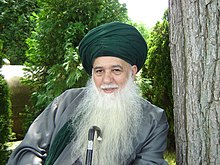This article may be in need of reorganization to comply with Wikipedia's layout guidelines. (July 2023) |
 Sheikh Hisham Kabbani founder of As-Sunnah foundation of America | |
| Founder | |
|---|---|
| Hisham Kabbani | |
| Religions | |
| Islam | |
| Scriptures | |
| Quran, Hadith and Sunnat Jurisprudence: Hanafi |
As-Sunnah Foundation of America[1] (ASFA)[2] is an educational organization that works for the unity of the Islamic faith in the United States, founded and chaired by Hisham Kabbani. Founded in 1997, together with the Islamic Supreme Council of America (ISCA), the ASFA has close connections to Kabbani's Naqshbandi Haqqani Sufi Order.[3] The ASFA is said be a main organization of Nakshbandi Sufi order in America.[4]
Kabbani's sunnah.org website is mentioned in the article "Sufi Charisma on the Internet" by Garbi Schmidt (2004).[5]
- ^ Tharoor, Ishaan (15 November 2014). "Muslims discovered America before Columbus, claims Turkey's Erdogan". Washington Post. Archived from the original on 14 January 2021. Retrieved 21 July 2020.
- ^ The Minaret: The Islamic Magazine. Islamic Center of Southern California. 1997.
- ^ Encyclopedia of Islam in the United States, Jocelyne Cesari (ed.), Encyclopedia of Islam in the United States, vol. 1, Greenwood Press, 2007, ISBN 978-0-313-33626-3, p. 457.
- ^ Curtis, Edward E. (2010). Encyclopedia of Muslim-American History. Infobase Publishing. ISBN 978-1-4381-3040-8.
- ^ D. Westerlund (ed.), Sufism in Europe and North America, Sufism in Europe and North America, London–New York: Routledge Curzon, 2004, p. 123. "Kabbani gives several examples of what he sees as the characteristics of the opposition between radical Islam and traditional Islam. Traditional Islam is described as peace-loving, moderate, a basis for unity and based on a democratic idea of the umma. Radical Islam, on the other hand, is violent, dictatorial, a source of fragmentation and destructive for the umma. Traditional Islam is apolitical and tolerant as long as the faithful are allowed to practise their religious duties, while radical Islam is engaged in politics solely to gain power and authority. Traditional Islam is characterised by knowledge and linked to a lineage of Muslim scholars who have a profound knowledge about the religious message, while radical Islam is characterised by a lack of knowledge, dilettantism and wrongful guidance."